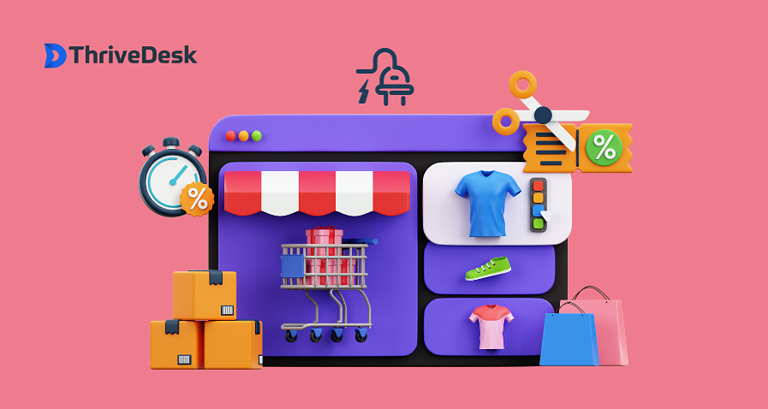Can a competitor really write a fair list of alternatives?
You’re here searching for Help Scout alternatives, and we happen to be one of them. ThriveDesk is the tool we know best, so of course it’s the one we believe in the most. That makes us a little biased — we’ll admit it.
…but bias doesn’t mean we can’t be useful. After helping thousands of businesses, we know ThriveDesk isn’t the perfect match for everyone, and that’s okay. Our goal is to help you find the right fit, even if it’s not us.
We hope you’ll give ThriveDesk a try after reading — and if it’s not the one, we’re happy to point you to some other great options below.
5 Help Scout alternatives
Your 5 Help Scout alternatives for 2026

Helpdesk Cost Calculator
Stop guessing. Compare real monthly costs for ThriveDesk, Freshdesk, Gorgias, Intercom, and more based on your team size and feature needs.
To save you from endless tabs, we pulled all the key data into one spreadsheet that helps you find Help Scout alternatives and competitors on data points like pricing, documentation, and customer support. The data is accurate as of Sep 20, 2025.
We’ll walk you through some of the strongest alternatives in the market, including ourselves, of course. Whether you’re a lean eCommerce shop or a growing SaaS team, there’s an option out there that won’t drain your budget or sanity.
1. ThriveDesk (hi 👋)
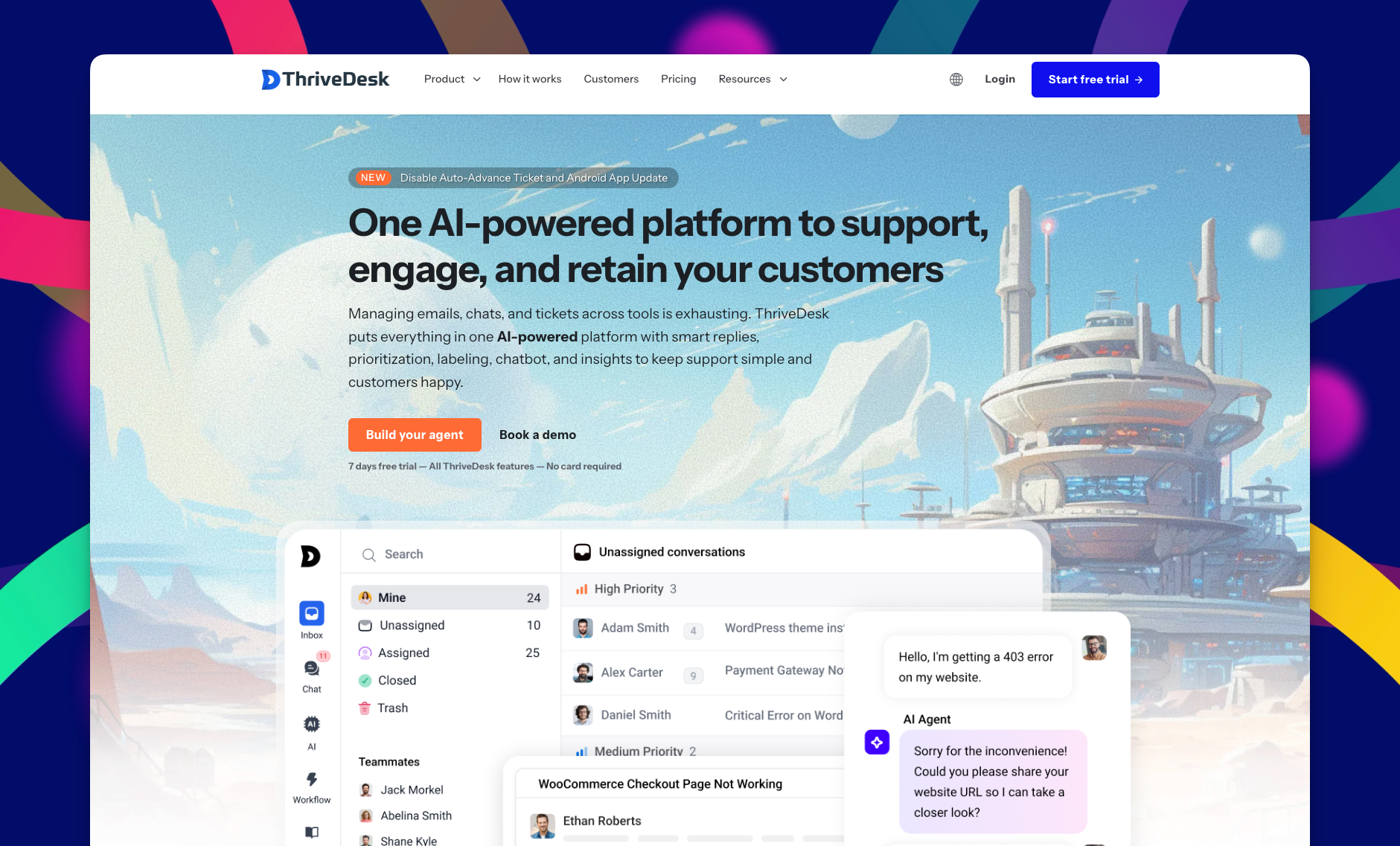
ThriveDesk was built for small businesses and eCommerce teams that want powerful customer support tools without the complexity or enterprise-level bloat. Founded by a team who once struggled with expensive and confusing platforms, ThriveDesk combines everything you actually need such as helpdesk, live chat, chatbot, and knowledge base in one lightning-fast workspace.
It is designed to be simple where it should be and smart where it matters. From AI automation to deep eCommerce integrations, ThriveDesk helps teams deliver personal, efficient, and human support that customers love.
AI Helpdesk built for speed, clarity, and growth
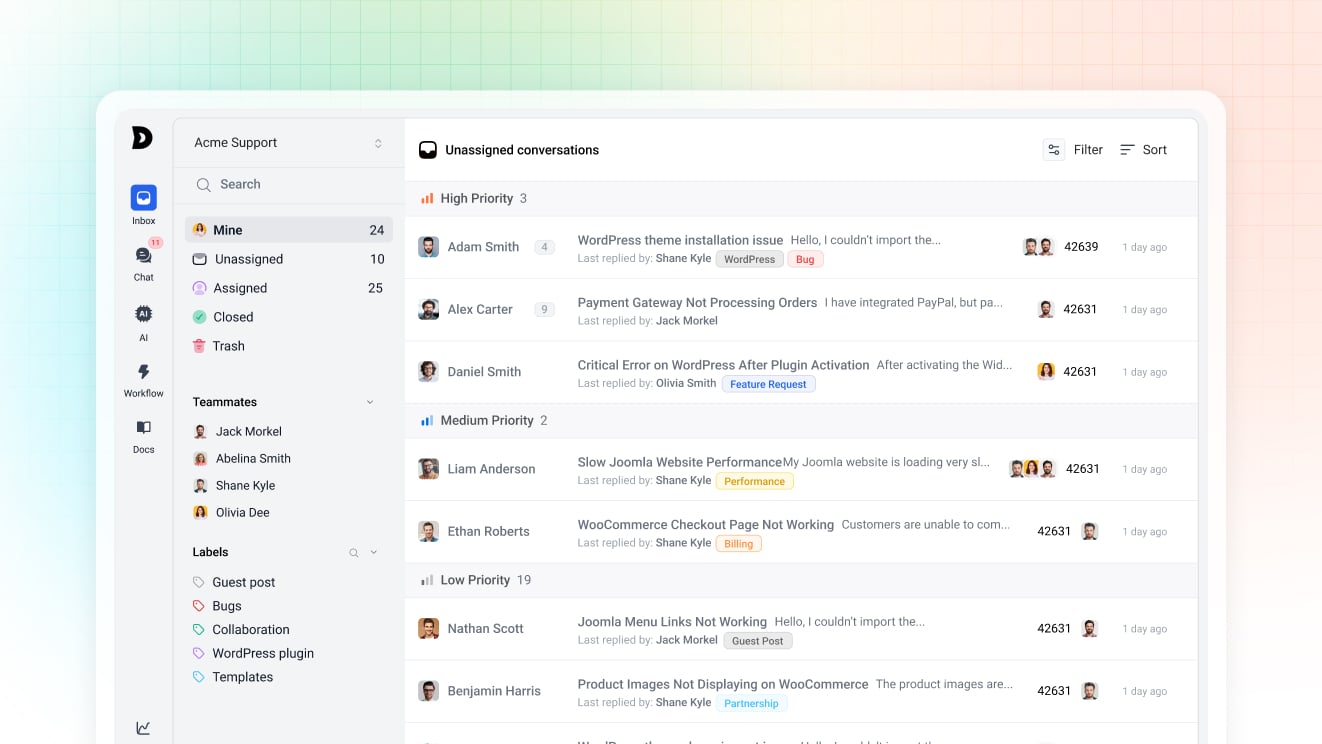
ThriveDesk’s shared inbox keeps your entire support team on the same page. It helps you manage customer conversations from email, chat, and other channels in one clean, unified view. No more messy threads or duplicate replies. Everyone sees the full picture.
Key features:
- Custom view: Build your own filtered inboxes by status, tag, priority, or assignee so every agent can focus on what matters.
- Collision detection: Instantly see when someone else is replying so you never send duplicate answers.
- Saved replies: Create reusable responses for common questions to save time and keep your tone consistent.
- Continue from your own email: Agents can reply directly from their own email client while keeping everything synced in ThriveDesk.
- Assignment and rules: Automatically assign tickets to the right team members based on tags, subjects, or priorities.
- Conversation history: See the entire context of every customer interaction in one place for faster, more accurate replies.
- Tags and custom fields: Categorize and organize conversations to track issues and performance easily.
AI agents that makes customer support effortless
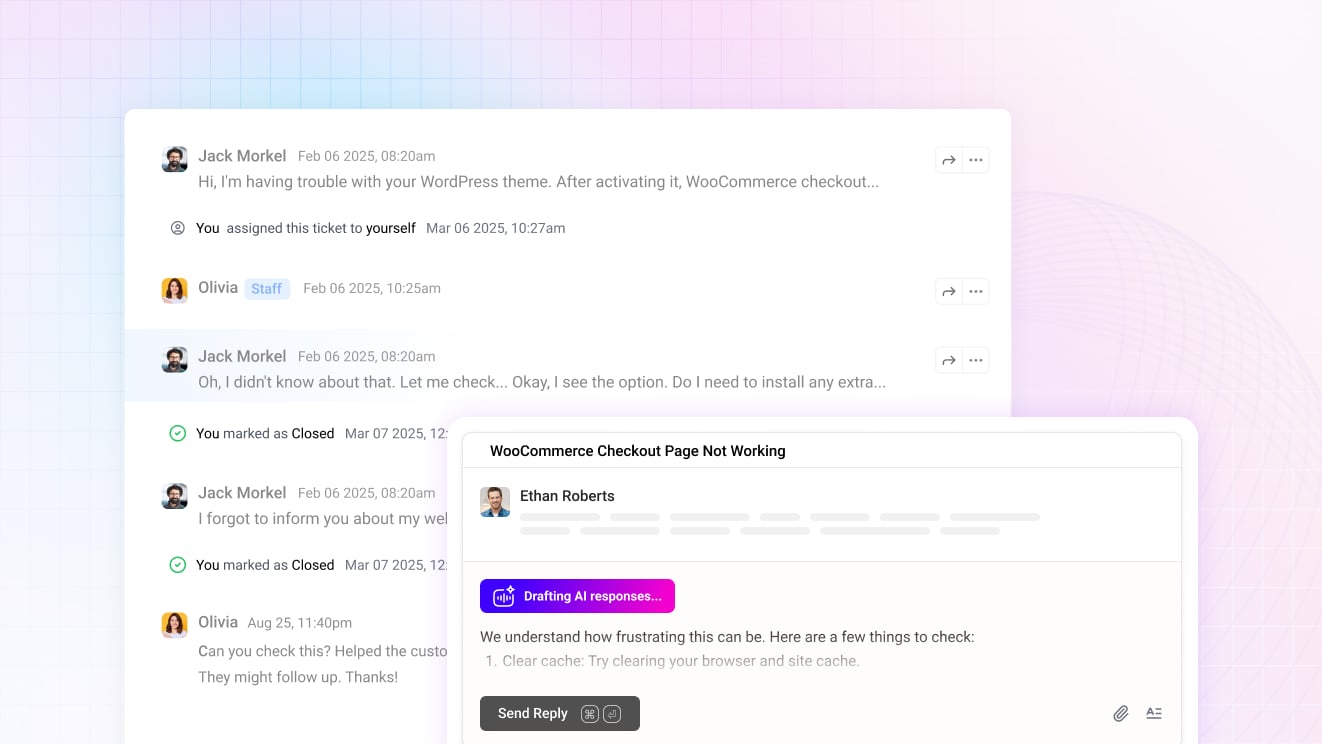
ThriveDesk uses AI to make customer support faster and smarter without removing the human touch. These tools help your team respond quickly, automate routine work, and maintain consistent quality.
AI features:
- AI Assist: Expand, shorten, or translate messages instantly to match tone and context.
- AI Summarize: Get concise summaries of long tickets or threads to understand issues at a glance.
- AI Draft: Generate helpful, ready-to-send replies for faster response times.
- AI Auto Reply: Automatically respond to common questions while your team focuses on complex ones.
- AI Chatbot: Neo, the built-in AI chatbot, helps customers 24/7 and can even collect leads or guide purchases.
- Workflow automation: Set triggers and rules to automate repetitive actions like ticket assignment, tagging, or follow-ups.
End-to-end AI Assistant for conversational support
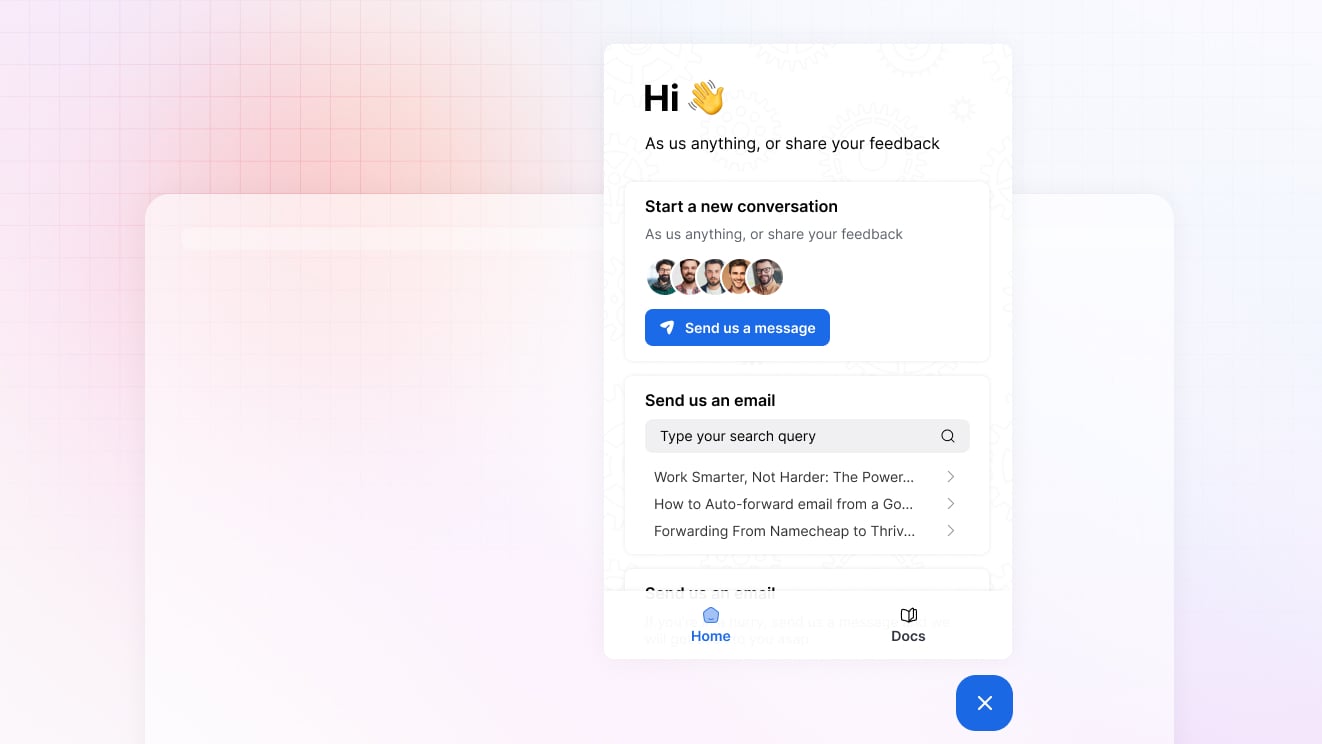
ThriveDesk’s Assistant widget adds instant customer support to your website. It brings together chat, contact forms, order tracking, and your knowledge base in one elegant widget your customers will actually enjoy using.
Inside the widget:
- Chatbot: Let Neo greet customers, answer FAQs, and guide them toward solutions automatically.
- Contact form: Capture inquiries directly from your site and route them into your shared inbox.
- Order check: Integrate with your store so customers can check order status without contacting support.
- Knowledge base: Let users search articles right inside the chat widget for quick self-service answers.
eCommerce and SaaS Integrations
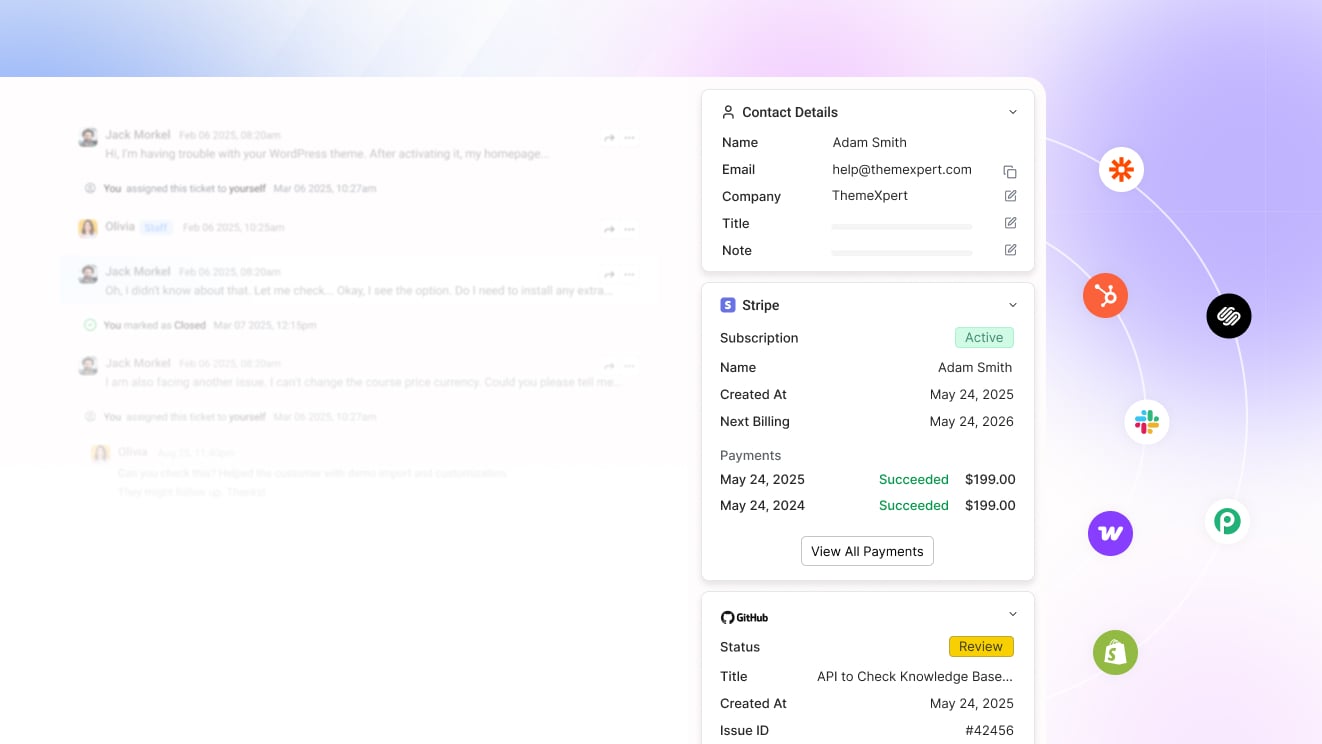
ThriveDesk connects seamlessly with the tools your business already uses. These integrations pull in customer and order data automatically so your agents have full context without switching apps.
Supported integrations:
- Stripe: View and manage billing and payment history directly from your helpdesk.
- Paddle: Handle subscription or license-related tickets with live Paddle data inside conversations.
- WooCommerce: See order details, update statuses, and assist customers without leaving ThriveDesk.
- SureCart: Access purchase information and resolve support issues faster with native SureCart integration.
Help Center – Self-Service Knowledge Base

Empower customers to find answers on their own with ThriveDesk’s Help Center. It is simple to build, beautiful to read, and powered by AI to make support scalable.
Features:
- AI writing: Generate clear, consistent articles from short prompts or ticket replies.
- Notion-like editor: Write and format with ease using a smooth, block-based editor that feels natural and modern.
- AI search: Help customers find exactly what they need with smart, context-aware search powered by AI.
ThriveDesk Pricing
ThriveDesk uses straightforward pricing based solely on the number of inboxes per month. Here’s a pricing snapshot:
- Basic: $29/month
- Standard: $69/month
- Unlimited: $129/month
💛 Friendly tip: Many tools look affordable at first but get expensive once you add extra fees for agents, overages, or “premium” support. ThriveDesk is the only provider on this list that gives you unlimited agents on Unlimited plan and never charges extra for support.
One final thing…
We think you’ll like knowing there are real humans behind this product. We’re a nimble team, part remote and part in-office, working side by side to build mighty things. We love doing team activities and regular outings, because building great software is easier when you actually enjoy the people you work with.

2. GrooveHQ
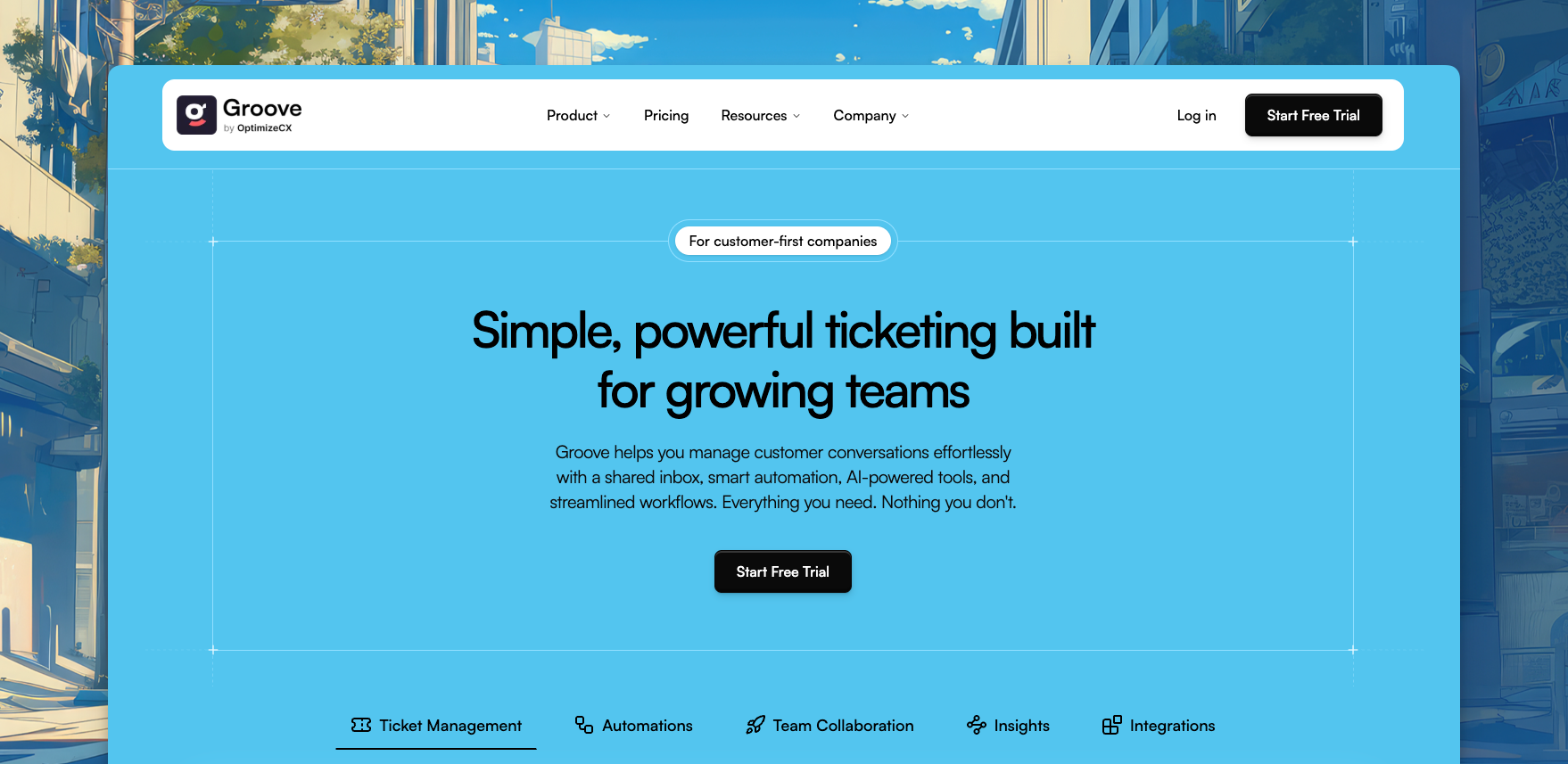
GrooveHQ brands itself as the “anti-Zendesk” — a simplicity-first helpdesk for small businesses that want collaborative inboxes without the enterprise bloat. The tradeoff? It’s great for small teams but doesn’t scale well into complex setups.
But simplicity has its tradeoffs. Groove doesn’t scale as gracefully into more complex support setups, and many advanced features you’d expect from modern helpdesks are either limited or missing altogether.
👍 Pros
- Clean and simple UI: Groove’s interface is straightforward, reducing the learning curve for small teams.
- Shared inbox focus: Designed around making email-based support collaborative and transparent.
- Transparent founder story: Alex Turnbull famously blogged his “Journey to $100K” publicly, building trust through radical transparency.
- No surprise add-ons: Pricing is transparent compared to competitors with hidden extras.
👎 Cons
- Not ideal for scaling: Works fine for a small team, but larger organizations quickly hit ceilings.
- Fewer integrations: The ecosystem is smaller compared to major players, limiting workflow flexibility.
- Reporting is basic: Analytics don’t go deep, making it harder to optimize or track performance over time.
Groove Pricing
Three tiers with per-agent pricing:
- Standard: $29/user/month
- Plus: $45/user/month
- Pro: $70/user/month
While predictable, the Pro tier costs as much as Help Scout but without the same feature depth.
📝 Fun Fact: Blog to Success
Groove was famously bootstrapped for years by founder Alex Turnbull, who blogged transparently about every stage of growth. His posts about “startup honesty” (sharing revenue numbers, struggles, and mistakes) built Groove a cult following in the SaaS world — arguably making their blog more famous than the product itself.

Helpdesk Cost Calculator
Stop guessing. Compare real monthly costs for ThriveDesk, Freshdesk, Gorgias, Intercom, and more based on your team size and feature needs.
3. HelpDesk
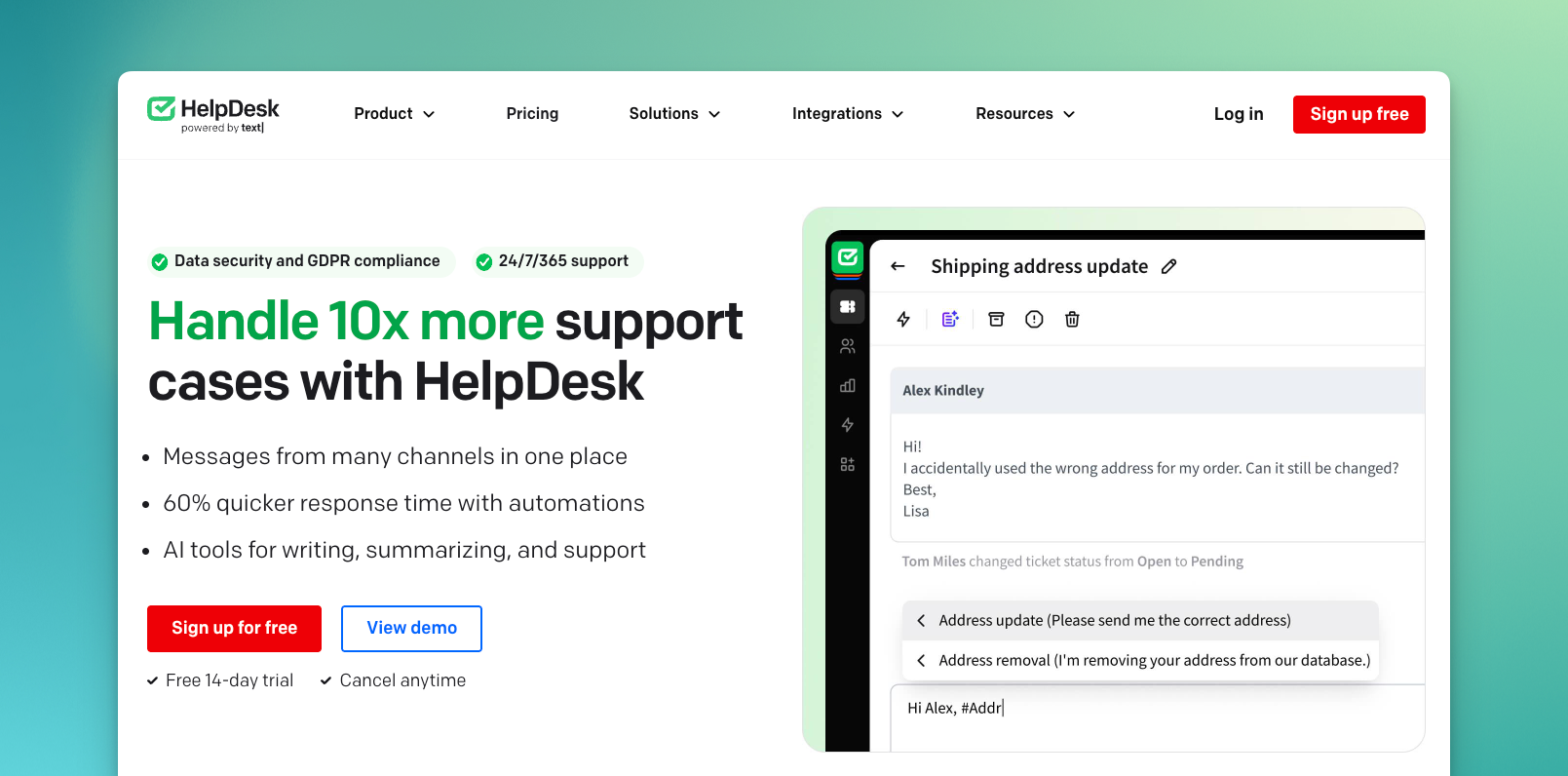
The confusingly named “HelpDesk” from Polish company Text (formerly LiveChat Software S.A.) is a legacy ticketing system that’s been around since the early 2000s. Despite the generic name, it’s actually just one piece of a multi-product puzzle that Text has been building for over two decades.
The platform focuses narrowly on email ticketing, which would be fine—except that in 2025, businesses expect live chat, chatbots, and knowledge bases to come standard. Spoiler alert: they don’t, and acquiring them means buying separate products from the same company at separate price points.
👍 Pros
- Simple ticketing system: Does email ticketing competently without unnecessary complexity.
- Security focused: GDPR compliant with strong encryption and audit logs for enterprise customers.
- AI features included: Basic AI assist for ticket summarization and sentiment analysis comes with all plans.
👎 Cons
- Live chat sold separately: Despite being made by the “LiveChat” company, chat support requires their separate LiveChat product ($41+/agent/month).
- No built-in knowledge base: Self-service is only possible through their KnowledgeBase product ($59/month).
- Automation locked away: ChatBot is another add-on starting at $52/month.
- Fragmented experience: Feels like buying a car where the stereo, AC, and seats are all extra.
HelpDesk Pricing
Base HelpDesk pricing:
- Team: $34/agent/month
- Business: $59/agent/month
- Enterprise: Custom
Add-ons:
- LiveChat: $41+/agent/month
- KnowledgeBase: $59/month flat
- ChatBot: $52+/month
That “$34” plan quickly turns into $100+/agent/month for a complete setup — with separate logins and bills to manage.
🗄️ Fun Fact: Built on LiveChat’s Legacy
HelpDesk was created as part of the LiveChat ecosystem. It started as a lightweight ticketing product for handling email. The product is reliable, but its roots show because it was built first for email tickets. Other support channels were added later as separate products.
This strategy worked for Text, the parent company, and they even went public on the Warsaw Stock Exchange. For customers, though, it can add extra complexity and cost when all they want is simple and unified customer support software.
4. Zendesk

The granddaddy of customer support software, Zendesk has been around since 2007. It quickly became the “enterprise default” for large companies that needed robust ticketing, reporting, and integrations. If Help Scout is the sleek new car, Zendesk is the heavy-duty truck — not flashy, but it can carry a lot.
👍 Pros
- Enterprise-ready: Rock-solid infrastructure with 99.9% uptime SLA and enterprise security features that big companies actually trust.
- Massive app ecosystem: Works with just about every CRM, marketing tool, and analytics platform.
- Advanced reporting: Deep analytics and customizable dashboards that make data nerds happy.
- Multichannel mastery: Email, chat, phone, social media, and SMS all in one platform without feeling bolted-on.
👎 Cons
- Steep learning curve: Zendesk’s interface can feel clunky and overwhelming for new users.
- Expensive quickly: Basic plans look reasonable until you add phone support, advanced AI, or premium features.
- Over-engineered for small teams: If you just need simple customer support, Zendesk might be overkill.
Zendesk Pricing
Zendesk Suite plans (includes everything):
- Team: $55/agent/month
- Growth: $89/agent/month
- Professional: $115/agent/month
- Enterprise: $169/agent/month
The Costco effect: That $55/month base price is just the starting point. Add AI features, premium integrations, or advanced analytics, and you’re quickly looking at $100+ per agent. It’s like ordering a car where the engine, wheels, and seats are all optional extras.
🪑 Fun Fact: The Danish Disruption
Zendesk was famously started in a loft in Copenhagen by three Danish guys with secondhand furniture from IKEA. The company went from zero to IPO in just 7 years, proving that sometimes the best way to solve a problem is to get really annoyed with existing solutions first.
Recommended Reading

5 Zendesk alternatives, recommended by… a Zendesk competitor?!
5. Gorgias
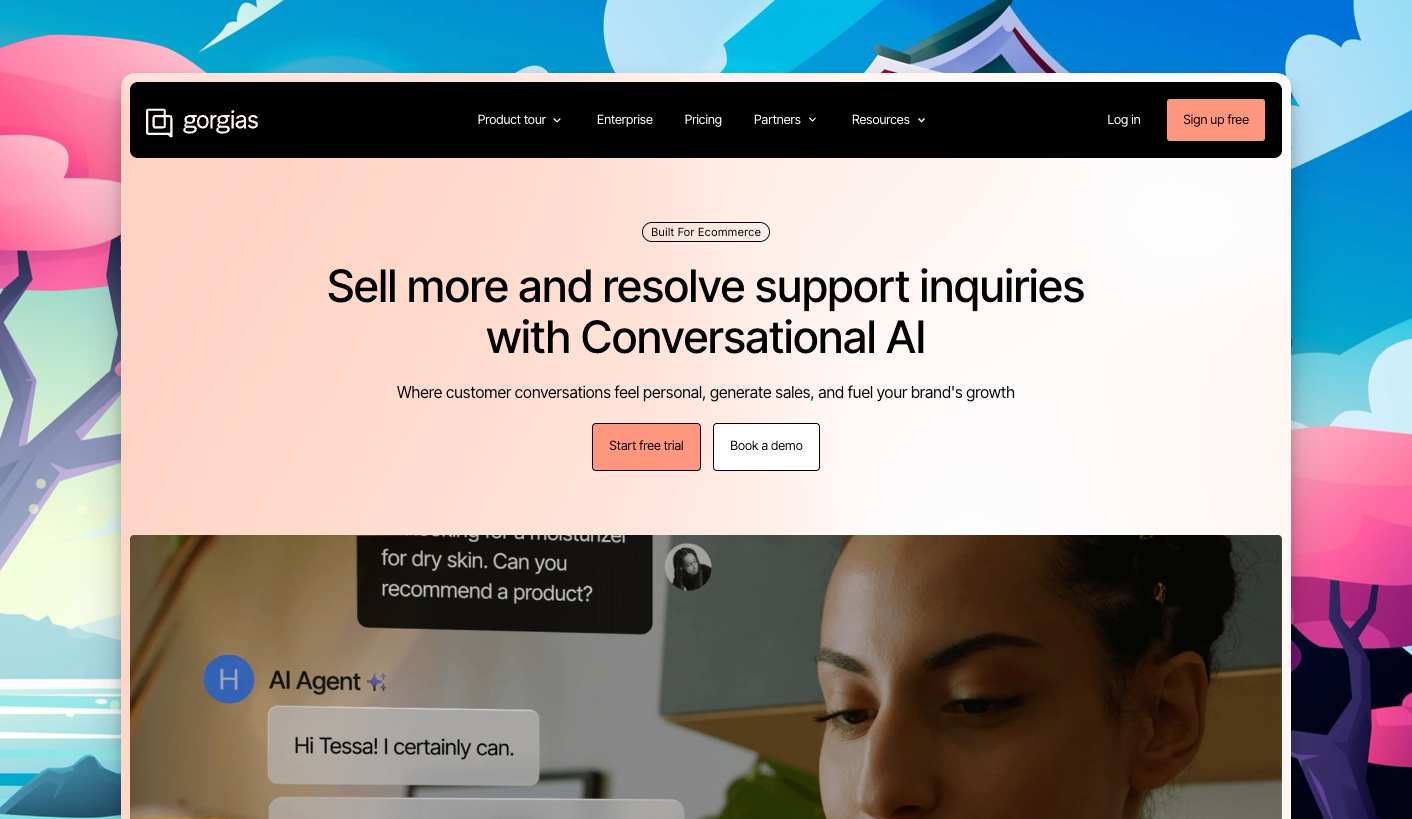
Think of it as the Shopify store owner’s helpdesk sidekick – it pulls in your order data, customer details, and even lets you refund or modify orders without leaving the helpdesk. Perfect if you’re answering “Where’s my package?” all day. The tradeoff? Gorgias lives for eCommerce and a real Intercom alternative but feels out of place for SaaS or B2B support.
All this power doesn’t come cheap (more on that in a bit), and some of Gorgias’s coolest tricks only unlock on higher-tier plans. Now, let’s break down the highs and lows:
👍 Pros
- Ecommerce-first design: Built specifically for online stores with native integrations that let agents edit orders, issue refunds, and manage subscriptions directly from tickets.
- Shopify integration depth: The most seamless Shopify helpdesk integration available, pulling customer data, order history, and product info automatically.
- No per-agent fees: Unlike many helpdesks, Gorgias doesn’t charge per seat on its main plans. In fact, aside from the smallest plan (3 users), all others let you have up to 500 users at no extra cost.
👎 Cons
- Ecommerce-only focus: If you’re not selling products online, Gorgias isn’t for you—the entire platform assumes you’re running an online store.
- Confusing pricing model: Ticket-based pricing with separate charges for voice, SMS, and AI automation makes budgeting difficult as you scale.
- Limited customization outside ecommerce: Great for stores, but lacks flexibility for other business models or custom workflows.
- Paywalls on some features: Be prepared to pay more for certain capabilities. For example, fancy add-ons like phone support (voice integration) or SMS are not included in standard plans – they cost extra per ticket.
Gorgias Pricing
Gorgias uses ticket-based pricing that gets complicated fast:
Base plans:
- Starter: 50 tickets/month at $10/month
- Basic: 300 tickets/month at $60/month
- Pro: 2,000 tickets/month at $360/month
- Advanced: 6,000 tickets/month at $900/month
What looks like $60/month can balloon to $200+ once you add phone support, text messaging, and AI features. The ticket-based model means unpredictable costs during busy seasons like Black Friday.
🌐 Fun Fact: From Chrome Extension to Helpdesk
Gorgias wasn’t always a full-blown helpdesk – it actually started life in 2015 as a Chrome extension for Gmail. The original tool helped customer support reps send faster templated email replies. After getting accepted into Y Combinator, the founders (two French entrepreneurs) realized that the real opportunity was in overhauling eCommerce customer support software, which led to the Gorgias we know today.
We made it to the end, friends!
Here is the comparison spreadsheet once again: if you need to see it, just click on it ↓
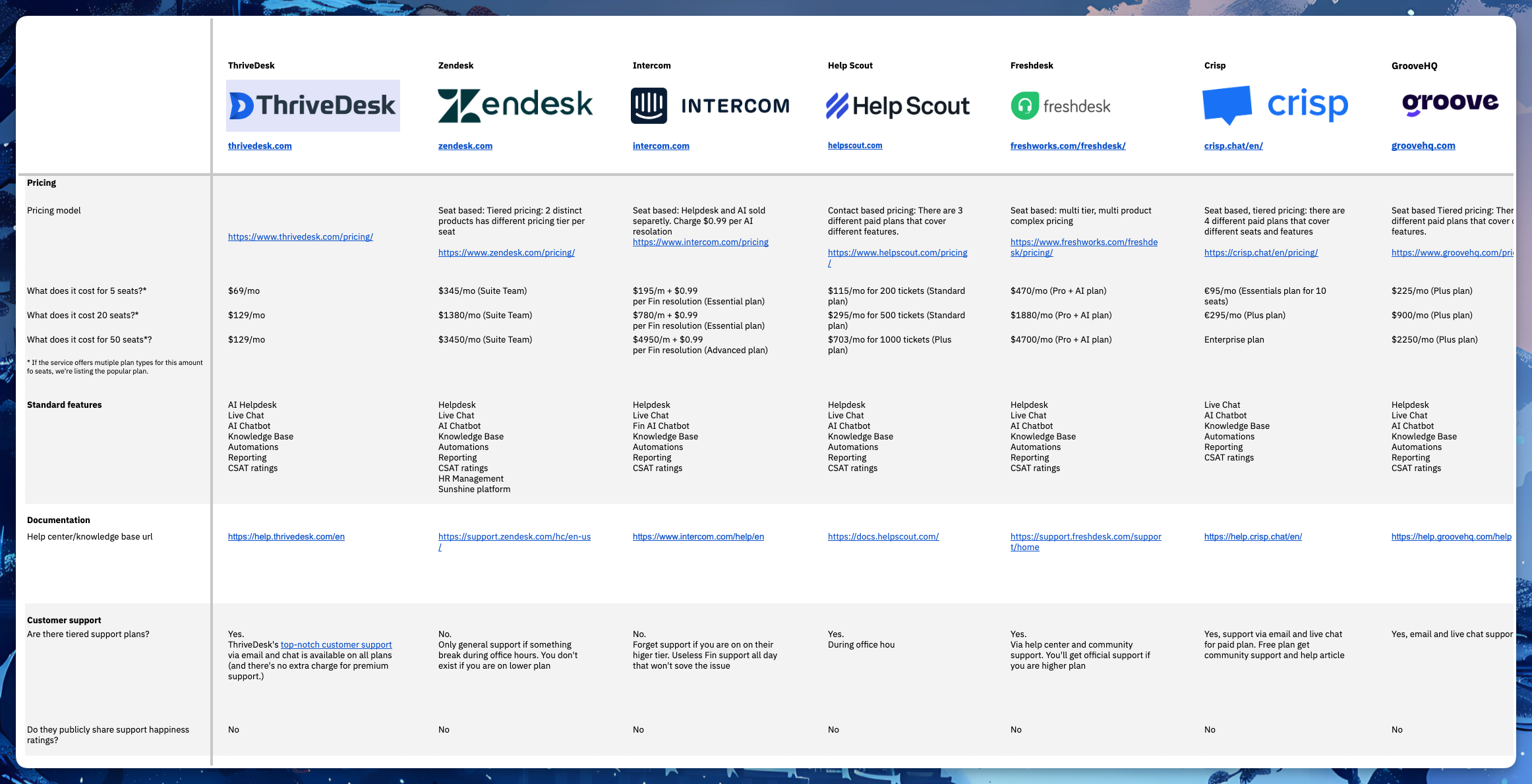
Why don’t you to give this Help Scout alternative a try?
Join thousands of businesses that already trust their customer support to ThriveDesk.




